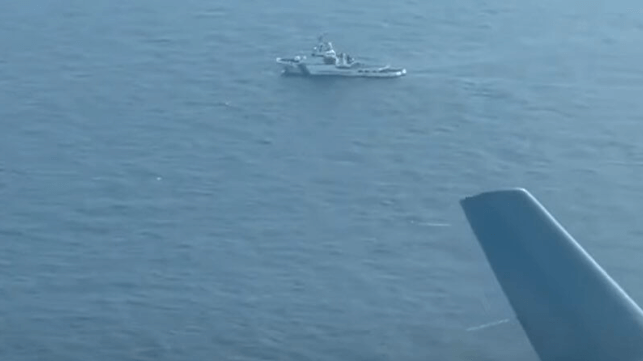Op-Ed: China Comes Knocking at Indonesia's Front Door

[By Euan Graham]
China is testing Prabowo Subianto’s new administration, with three successive incursions by China Coast Guard vessels into Indonesia’s exclusive maritime jurisdiction—the first occurring on the new president’s inaugural day in office.
Jakarta urgently needs to recalibrate its South China Sea diplomacy and to revisit its basic assumptions about China. China’s move south should also be a wake-up call to Canberra that its pursuit of supposed bilateral ‘stabilisation’ with Beijing is irrelevant to China’s strategic intentions.
These incursions are more than a test of Prabowo’s mettle. They are hard evidence that the economics-first, neutrality-based approach of Prabowo’s predecessor, Joko Widodo, fundamentally failed to temper China’s maritime expansionism in the southernmost reaches of the South China Sea. China is making it crystal clear to Prabowo that it still claims ownership over all waters and seabed resources within the dashed-line claim, including part of Indonesia’s continental shelf and exclusive economic zone (EEZ) around the Natuna Islands.
This is despite Jakarta’s longstanding official position that it has no jurisdictional dispute with China, given the legally baseless nature of the Chinese ambit claim. However, under Prabowo, Indonesia’s maritime authorities appear to be implementing greater transparency about China’s activities near the Natuna Islands, quickly releasing video and audio of the Chinese Coast Guard’s challenges to Indonesian vessels in the area.
If Jakarta thought it had obtained a diplomatic modus vivendi with Beijing despite their differences in the South China Sea, China’s leadership clearly has other ideas. One prominent Indonesian analyst has argued that Philippines-China relations deteriorated because Manila’s diplomacy was out of kilter with the Association of Southeast Asian Nations’ (ASEAN) holistic and non-confrontational approach towards Beijing. In fact, China’s incursions near the Natuna Islands should prompt Jakarta to question its own diplomatic settings towards China, ASEAN and the South China Sea. By failing to support the Philippines diplomatically, the previous Indonesian administration only emboldened China’s divide-and-conquer tactics, now seen on Indonesia’s maritime doorstep.
Under Widodo, Jakarta prioritised economic benefits in its relations with Beijing, contributing to China becoming Indonesia’s largest source of inward investment. Indonesia remained party to the intractable negotiations between China and the Association of Southeast Asian Nations for a code of conduct in the South China Sea. But it did not invest real energy behind the effort, with the result that the process has drifted aimlessly from one ASEAN chairmanship to another, weakening the organisation’s collective resolve.
Indonesia must now belatedly put its full weight behind those negotiations, either to secure a meaningful outcome or terminate the talks if Beijing continues to stall. Jakarta should meanwhile muster diplomatic support within Southeast Asia for the Philippines, a fellow ASEAN founder member facing a clear external threat, as Indonesia did for Thailand in the 1980s. Southeast Asia’s collective security must come ahead of any single member’s economic benefit, in conformity with ASEAN’s foundational spirit and diplomatic purpose.
China has unfortunately received the message that Southeast Asia can easily be splintered by working bilaterally and exploiting its greater leverage relative to any one of the countries. Malaysia’s supplicatory position towards China under Prime Minister Anwar Ibrahim has only fanned Beijing’s confidence that it can divide-and-rule ASEAN with ease.
One of China’s follow-up objectives is to persuade Indonesia that it should ‘properly handle maritime issues’, contingent on broader factors in their relationship. Jakarta should be alert to China’s bad-faith intentions, including offers of dialogue, and double down instead on the code-of-conduct negotiations. In doing so, it would return to its traditional leading-from-behind role within ASEAN.
Indonesia must vocally support the Philippines and Vietnam whenever they face Chinese aggression in the South China Sea. Jakarta should prioritise efforts to reach an EEZ boundary agreement with Vietnam, building on Indonesia’s successful maritime boundary delimitation with the Philippines. This will make it harder for Beijing to exploit differences among the Southeast Asian littoral states. Prabowo’s decision to send military assets to assist the Philippines as part of a four-nation ASEAN disaster relief mission was a commendable signal of solidarity and good will.
China may justifiably feel that Southeast Asia is tipping its way overall, and that the Philippines appears isolated within ASEAN. But poking Indonesia is never an advisable strategy. By overbearingly doing so, China reveals its hubris.
Prabowo may be a mercurial figure, but he’s unlikely to be a pushover. An axis of cooperation among Indonesia, the Philippines and Vietnam could still obstruct Beijing’s path towards dominance in the South China Sea. But Jakarta must draw its own clear-eyed conclusions about China’s strategic intent from first principles.
Australia should take note. Beijing’s direct challenge to Indonesia’s maritime sovereign rights, despite years of favourable treatment by Widodo, calls into question the meaning of what Canberra is calling ‘stabilisation’ with China.
Beijing’s strategic behaviour continues to be deeply inimical to Australia’s security within the immediate region. China is steadily marching south, while Australia’s government seemingly obsesses over lobsters and wine exports.
Euan Graham is a senior analyst with ASPI. This article appears courtesy of ASPI's The Strategist, and may be found in its original form here.
The opinions expressed herein are the author's and not necessarily those of The Maritime Executive.
